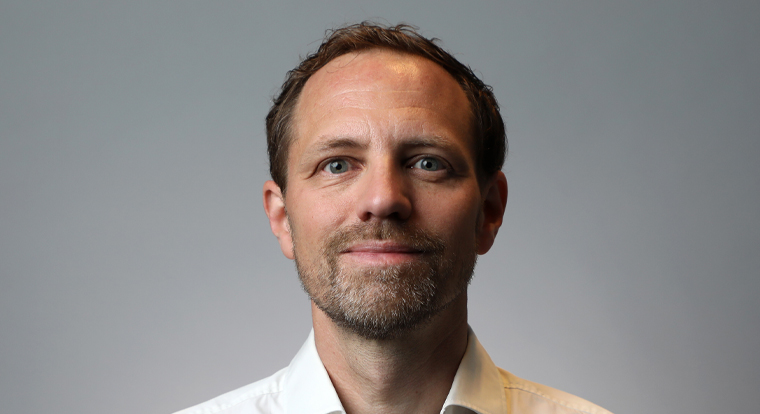Malte Gerhold: ‘We need to make implementation and adoption exciting’
- 26 November 2024

As director of innovation and improvement, Malte Gerhold leads the Health Foundation’s work to enable change in health and care services through technology and data.
Yet despite having ‘innovation’ in his job title, he is keen to turn attention to the “long hard grind” that is required to get the best out of existing and novel technologies.
For Gerhold, implementation done well and “focused change support” is more exciting than a cutting-edge technology that becomes blunted in the day-to-day reality of the NHS.
His previous roles, which include the digital startup Birdie, the Care Quality Commission, the Prime Minister’s Delivery Unit, and the Department of Health and Social Care, “have always been at the interface between thinking through the problem, trying to identify the solution, but also then being involved in the actual implementation”.
Ahead of speaking at Digital Health Rewired 2025, Gerhold tells Digital Health News why politicians and NHS staff need to become excited about implementation, his hopes for the government’s forthcoming 10-year health plan, and what it takes to make technology work better for NHS staff and patients.
Did the budget in October 2024 do enough to support tech/digital in the NHS?
The budget’s commitment to invest in new equipment, infrastructure and digital technology is very welcome, but buying the technology is only half the story. The other half is about implementing it successfully, whether that is about improving productivity, improving time to care or better staff experience.
To get the benefits out of technology the government needs to fund not just the tech, but also the change by supporting staff to implement the technology. It may also mean providing more systemic incentives for adopting technology, multi-year funding and revenue funding, not just capital funding.
The government needs to fund not just the tech but also the change
We did a mapping in 2021 of innovation funding programmes, and found that out of the 31 that we looked at, only four provided funding dedicated to adoption and implementation, rather than new innovations.
The 10-year health plan needs to address the government’s approach to change and implementation. Then the spending review will need to address how that that’s going to be supported, because it doesn’t come for free.
The Darzi review highlighted that many NHS staff experience technology as an additional burden. How can we improve user experience and support staff to use it to improve productivity and outcomes?
I believe the budget announcement shows the government is beginning to pay attention [to the barriers that staff face in using technology] because a lot of capital investment is about basic infrastructure, rather than just trying new things. But there’s more that can and should be done to make staff feel that they get the benefits out of technology.
More often than not, we don’t start from the problem that staff want solving and [then] focus on how technology can make that happen. There’s a greater role here for clinical leaders, including the royal colleges, to articulate what we want clinical roles and other roles to look like in the future, and then to ask how can technology can support that.
I don’t think we pay enough attention to what success for new technology looks like. We did some polling asking staff what they would do with the time if it was freed up through technology. They provided a whole range of things that they would like to do including reducing unpaid overtime, training, research, and wider improvement activities.
There needs to be a conversation at the beginning of a project with the relevant stakeholders, particularly staff, to define what success looks like. In most cases that’s not just going to be more clinical activity or greater productivity, it’s also going to be increased wellbeing or a better experience for staff.
Why is innovation so often let down by poor implementation?
A lot comes down to political attention being more focused on new and exciting innovation, technology and discoveries, compared to the long hard grind of getting the most out of technology.
Announcing investment in change, capacity and transformation is nowhere near as exciting politically as announcing new medications or scanners or AI solutions. We really need to make implementation adoption exciting again, for staff, but also for the politicians.
We know that getting the benefits from electronic health records requires organisations to look at the functionality they offer them and to change how care is being delivered or how teams collaborate, or how data is being used. Those are the benefits that require more focused change support, rather than just implementation of technology.
“Announcing investment in change, capacity and transformation is nowhere near as exciting politically as announcing new medications or scanners or AI solutions
It’s not that helpful to just talk about innovation anymore, because in order to implement technology you need pathway design, cross team collaboration, and process optimisation. That’s much more about improvement approaches and change expertise than it is about innovation and technology per se.
Realising the benefits of technology is not just about digital maturity. It’s also about organisational maturity.
Research by the Health Foundation found that while most NHS staff and patients support the use of AI for patient care, a significant minority fear it will make care quality worse. How can we build confidence in AI and unlock its benefits?
The Health Foundation has called for an AI strategy for the NHS. The only way to ensure the benefits of AI will be spread across the NHS is by doing it much more systematically.
Deploying AI raises questions that aren’t just about individual use cases but also about the type of healthcare system we want to see in future. What’s the role of AI within that, and how do we manage the risks and trade-offs to be made?
We have to think about how AI is a complement to what healthcare staff do, rather than replacing them
About a third of staff and public are worried about the role of AI. One key worry from staff and patients is about losing human contact. If we want to deploy AI responsibly, we have to think about how AI is a complement to what healthcare staff do, rather than replacing them.
What you need is much more detailed engagement with both staff and patients to understand what they value in care and what trade-offs they are willing to accept. For example, would you accept a trade-off between human contact and speed of diagnosis through AI?
The answer is not going to be the same for everyone. We’ll need sophisticated understanding.
Can you give us a taster of what you’ll be talking about at Rewired 2025?
I expect my session to focus on the top lessons we have learned at the Health Foundation over the last decade about what it means to implement technology well and make sure we get the benefits out of it for staff and patients.
Gerhold will be speaking at Rewired 2025 at the NEC in Birmingham, 18-19 March 2025. Register here.
The event is co-headline sponsored by The Access Group and Microsoft. Alcidion, Nervecentre, Solventum and Cynerio are also sponsors.




